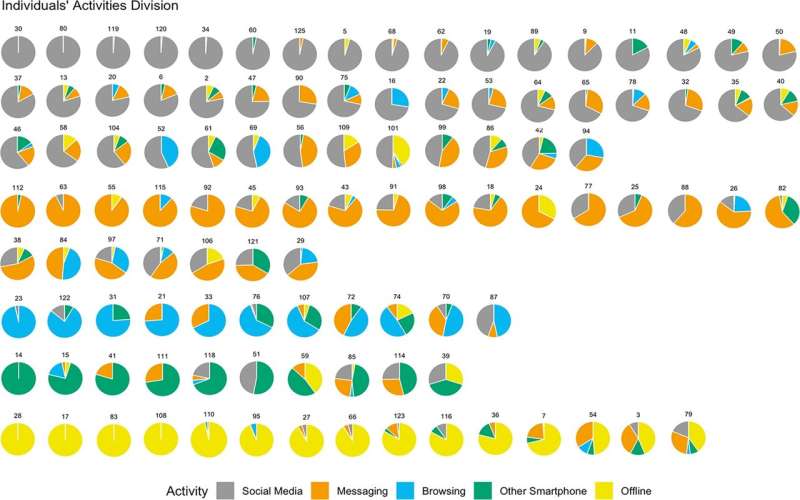Individual participants’ activity pie charts. While we tested 125 participants, we present data on 114 of these participants. Participants for whom we did not have data (n = 11), either because of technical difficulties, or because the stimulated recall interview did not take place, are not included in this figure. Participant IDs reported above the individual pie charts. Credit: 10.1057/s41599-021-00863-1
In the past few years, smartphones have been labeled as the key culprit behind scores of mental and physical ailments, from loneliness to boredom to addiction. But such conclusions are not warranted if we do not examine what exactly people are doing on their phones. According to a study conducted by Nastasia Griffioen of Radboud University, there are major differences in what young adults do on their phones, their motivations for these activities, and the sentiments these activities evoke. The research was recently published in Nature's Humanities and Social Sciences Communications.
Among other findings, Griffioen's research shows that there is no such thing as uniform "smartphone use." The research involved leaving 18–25 year-olds alone for 10 minutes while being secretly monitored and recorded. Griffioen: "About 80 percent of the group reached for their smartphones almost immediately, it is really a kind of automatic behavior for many people. However, nearly every one of the young adults we monitored had a completely different pattern of smartphone behavior. Some switched between different apps 21 times in the ten minutes, while others only used two apps; some were largely engrossed in messaging apps, while others primarily browsed."
Reducing stress
After the monitoring period, the researchers discussed the recording with the young adults in order to get a clear picture of their underlying motivations and emotions. "We noticed that young people enjoyed talking about it, and that provided really unique insights," explains Griffioen. "What we saw, for example, is that people had specific motivations when they browsed or opened WhatsApp. They wanted to check the weather, or schedule an appointment with friends. But those who took to social media often indicated that it was simply an automatic behavior for them, or that had sprung from boredom. Nevertheless, we saw no difference in the emotional scores of the various smartphone activities between things done out of boredom versus those done with a specific goal in mind. That suggests that doing something out of boredom or habit might not be so bad; for example, we know from other studies that repetitive behaviors can reduce stress and anxiety in people."
"Another unique insight is that it's often believed that social media has a largely negative impact due to all sorts of social factors, such as excessive comparison to others. However, we found that negative emotional scores for social media activities almost never involved a social factor—they often revolved around non-social things like football results or news. Positive emotional scores for social media activities, on the other hand, were often linked to social contacts, such as reading good news from someone in your circle of friends."
Screen time analysis says very little
These conclusions may seem obvious, but both in practice and in many scientific studies all forms of smartphone use are often lumped together. Your iPhone warns you if you are suddenly on your smartphone 30% more than a week ago, and a host of studies raise parents' suspicions if children are on their phones more often. "That kind of screen time analysis really doesn't say a whole lot. There's so much difference between why people use their phones, what they're doing on them, and what those activities can evoke: after thorough analyses in the field, we now have evidence that there is almost no direct causal link between smartphone or social media use and well-being, and it is time to broaden the discussion."
Griffioen: "In the future, we want to develop tools that allow young people to better reflect on what they do on their smartphone and why they do it. This research makes it clear to us that each young person is different and that having a clear picture of what technology is doing to you can help you benefit more from future interactions with technology. Although we don't get to see it from the outside, smartphones for young adults are a portal into a world full of possibilities, and it's time we started to better understand what their journey through that world looks like."
More information: Nastasia Griffioen et al, Everyone does it—differently: A window into emerging adults' smartphone use, Humanities and Social Sciences Communications (2021). DOI: 10.1057/s41599-021-00863-1
Provided by Radboud University
























